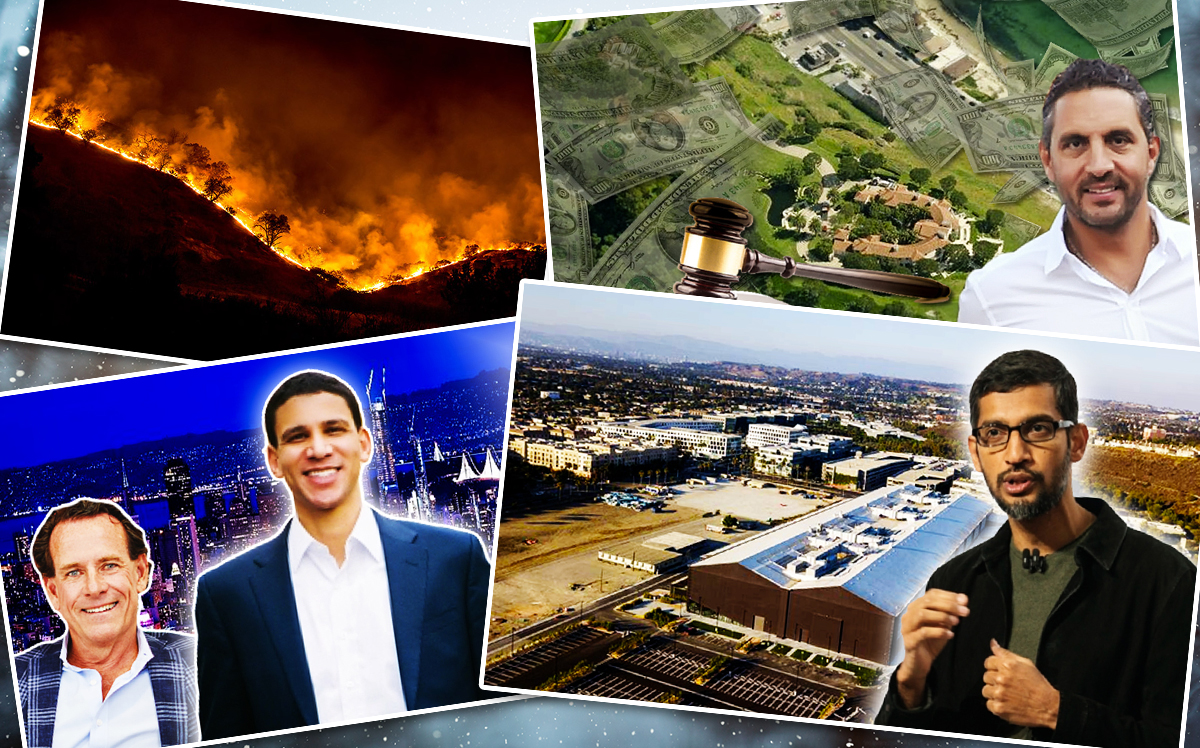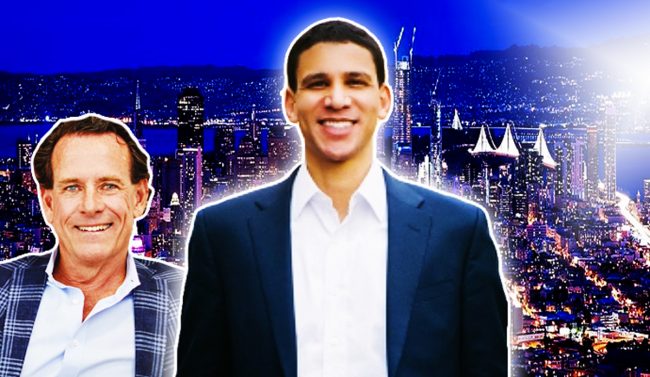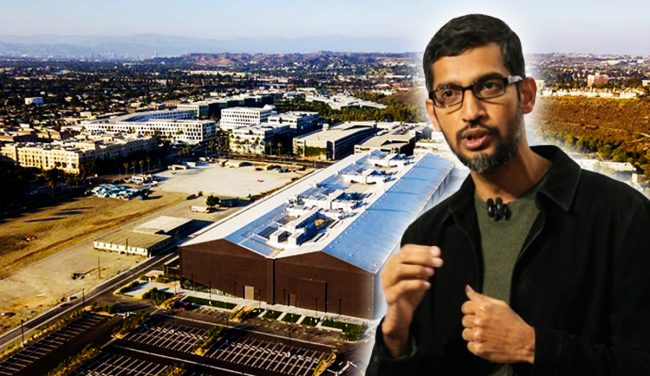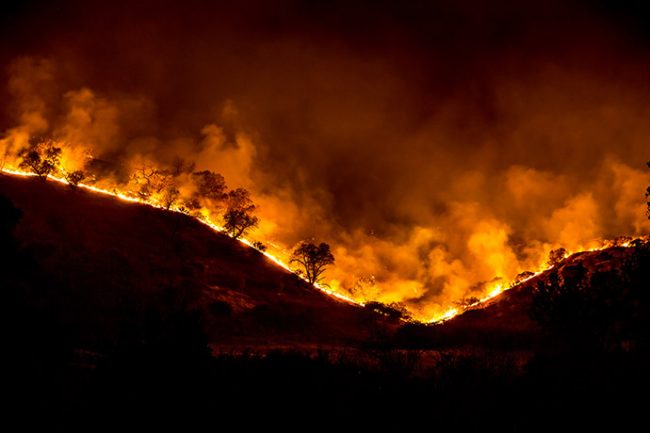Trending
LA’s biggest real estate stories of 2018
Record-breaking resi listings, Compass’ western expansion, Silicon Beach's growth spurt and legal trouble for developers, agents and politicians all grabbed headlines this year

There was no shortage of compelling real estate stories in Los Angeles in 2018, from the slew of scandals to the hot new commercial enclaves to the battle over sprawling new housing developments. The tech firms asserted themselves, led by Google opening its hanger-sized Spruce Goose office campus in Silicon Beach.
High-end residential owners and developers continued to set huge asking prices for their properties despite a softening market. While Hard Rock Cafe founder Peter Morton unloaded his Malibu compound for $110 million, that may have been the exception to the rule as others were still stuck with $10 million to $50 million properties without a nibble.
And though downtown L.A. continues to experience a building boom — especially in apartment construction — there is a question over whether the inventory can be absorbed at market-rate prices.
Listing prices reach for sky
Sellers in L.A.’s wealthiest neighborhoods went for broke, listing trophy properties at record-breaking asking prices.
The estate of billionaire Jerrold Perenchio, who was CEO of Univision, put his former mega-mansion in Bel Air on the market for $245 million, making it the most-expensive listing in the U.S. The home had previously been for sale for $350 million as a pocket listing.
Then there was the latest hype over a 157-acre property in Beverly Hills Post Office rebranded as The Mountain of Beverly Hills. A shift in ownership after a 30-year saga now finds the property on the market for a whopping $1 billion. The new listing broker is Aaron Kirman of Compass. Most of the brokerage community scoffed at the price, calling it a listing that was at least three times what a buyer was likely to pay. The property was once owned by game show host Merv Griffin.
Compass goes West

Mark McLaughlin sold to Compass but isn’t running combined West Coast operation.
Compass made strong moves in California over the last year.
In July, the SoftBank-backed firm bought Paragon, making Compass the largest residential brokerage in San Francisco. A month later, Compass agreed to acquire Pacific Union International Realty, the fifth-largest broker nationwide and the largest independent player in California with 1,700 agents. The move appeared to some competitors like a hostile takeover, given that Compass denied Pacific Union CEO Mark McLaughlin the opportunity to run the entire West Coast operation of the combined firms.
The takeover moves stunned local brokerages and unleashed a scramble for agents among competing agencies. Amid deteriorating margins Charles Dunn was forced to shutter.
The explosion of Silicon Beach

Google’s Spruce Goose finally opened in Playa Vista, tripling tech firm’s footprint in L.A.
On the commercial front, this was a year in which Silicon Valley-based tech deepened their commitments to a new tech and media corridor in L.A.’s West Side. After an extensive renovation, Google finally moved into the 319,000-square-foot Spruce Goose hangar in Playa Vista, tripling its footprint in the city. Facebook and other tech firms also leased large swaths of office space. Some media firm moves also involved the once-overlooked aerospace enclave of El Segundo farther south.
The big leases came as Snap Inc., the tech firm that had transformed Venice over the past two years, abruptly pulled out of the beachside community. The company moved to Santa Monica amid a declining business outlook, vacating its 163,000 square feet of office space.
But the arrival of thousands of new tech workers boosted apartment rental and real estate prices in Silicon Beach. Some of those tech employees used equity grants to fund home purchases. It also ushered in a flock of Bird scooters among car-averse millennials, setting off battles with local officials.
Trouble, trouble, trouble
An insurance company sued The Agency’s Mauricio Umansky for alleged impropriety.
The year saw a spate of legal troubles and scandals involving developers, real estate brokers and city officials.
Mauricio Umansky, reality TV star and co-founder of the Agency, found himself in hot water with an insurance company. In August, Western World Insurance alleged he conspired with another investor to underpay for a Malibu mansion then flip it for $70 million, a whopping profit.
The lawsuit — which is ongoing — came less than three weeks after Billy Rose, another Agency co-founder, stepped down as the firm’s broker of record.
Also making news, the FBI reportedly launched an investigation into luxury home developer Mohamed Hadid over the construction of a Bel-Air mansion. That followed a city official’s allegations that a building inspector had received “items of value” in connection with the assessment of a home that Hadid once said was worth $100 million. A neighborhood group has been pushing to stop the home’s construction. The case hinted at deeper potential problems in L.A.’s home inspection assessment department. Scrutiny may well intensify in 2019 as more revelations about the Hadid case are brought to light.
Potential corruption involving developments also ensnared the City Council, where Councilmember Jose Huizar’s office and home were raided by the FBI. Federal authorities hauled off boxes marked “fundraising” and other electronic records. The probe is also delving into donations made by developers, including Related Companies.
Softening market
Hefty listing prices and stubborn owners caused some tony enclaves like the Bird Streets to soften amid an oversupply. Sure, there were some enormous trades. Mostly notably, Hard Rock Cafe founder Peter Morton sold his Malibu compound for $110 million. But many other properties, especially glassy white spec homes asking $10 million to $50 million, sat on the market for several months, even a year or more.
L.A.’s housing market has experienced four straight quarters of sluggish sales, meaning the future doesn’t look too bright.
Luxury residential property owners would do well to heed the warning by Stephen Kotler, Douglas Elliman’s CEO for the Western Region. He said listings in that category were overpriced by around 50 percent.

The Woolsey Fire torched 97,000 acres and caused $5 billion of property damage.
Controversial housing community approved
As developers raced to push ahead projects that could seize on the region’s growing shortage of housing, one developer some 60 miles north of L.A. battled to develop a series of sprawling master-planned communities. Tejon Ranch is looking to build nearly 20,000 new homes and shape an uninhabited slice of California. After a two-decade struggle to win support for the largest of their proposed projects — Centennial — the L.A. County Board of Supervisors finally approved the project, over the objections of environmentalists who warned against the dangers of new urban sprawl.
A reckoning for downtown building boom?
Cranes were everywhere it seemed, as developers worked to complete dozens of new high-rise projects and hotel conversions downtown. June 2017 to June 2018 reported the most real estate transactions in L.A.’s history, including $10 billion in apartment sales.
More units were under construction in 2018 than at any point this century, yet at mid-year, the vacancy rate was at its lowest level since 2006. Going into the new year, several new buildings are due to be completed, including Oceanwide Plaza, which will deliver another 504 condos to the market.
But by year’s end, the growth of new units was actually slowing. Questions remain for 2019 when thousands of new units come online. Can the downtown market absorb all the new product or will the market remain tight as the cycle matures?




